I recently dusted off my old John Coltrane records, and I've been listening to them pretty much non-stop this weekend. Coltrane's one of those artists that I listen to intensely for weeks on end, before I need to pause, put the records down, and breathe a sigh of relief. For me, the intensity of the music itself seems to induce this kind of listening. Even though I'm generally partial to the fire and cinder of his late Impulse! records, "Giant Steps" is probably the record that's closest to my heart. Not only was it the first Trane record I bought, but it also opened my eyes to so much timeless music. It was also the soundtrack to a great, great summer...
After a rough week, I decided to indulge in baking some of "my favourite things". The first was a pain au levain, a bread that I never tire of. It's also one of those formulas that easily fit into my weekday routine. Here's my formula.
I mixed the dough Friday afternoon, and pulled the baked bread from the oven Saturday morning:
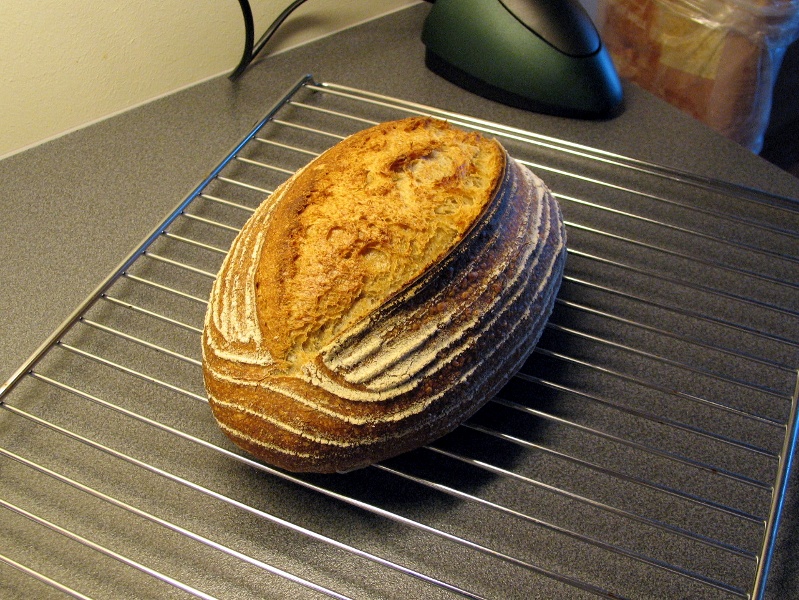
I really like the simplicity of the bread and formula. A crisp crust and a chewy crumb - it's a bread that's flavourful enough to be enjoyed on its own, with some butter, or a slice of Brie de Meaux.
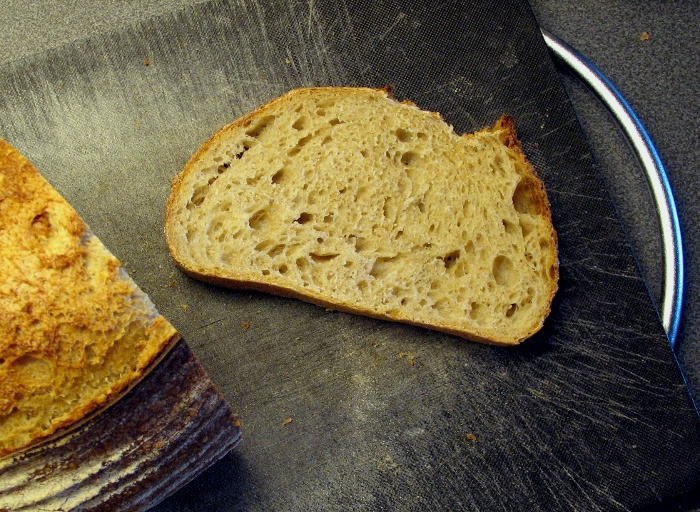
I've mentioned it before, and it's probably not something I'm the only one to think, but as the autumn and winter approach us, my preference swings towards wholesome breads. July's crusty baguette is replaced by a dense, filling rye come late October. Yesterday I baked a dense rye loaf based on Hamelman's "80% rye sourdough with rye flour soaker". I made some small changes to the formula, and you can find my adaption described here.
This is a dense, 80% whole rye bread, where a third of the flour comes from a ripe rye sourdough, and a fifth of the flour is scalded with boiling water. The scalding process increases water absorption, provides the bread with just a hint of sweetness, and lends the crumb a soft and moist mouthfeel. Here's the baked bread:
... and a "24 hour later crumb shot":
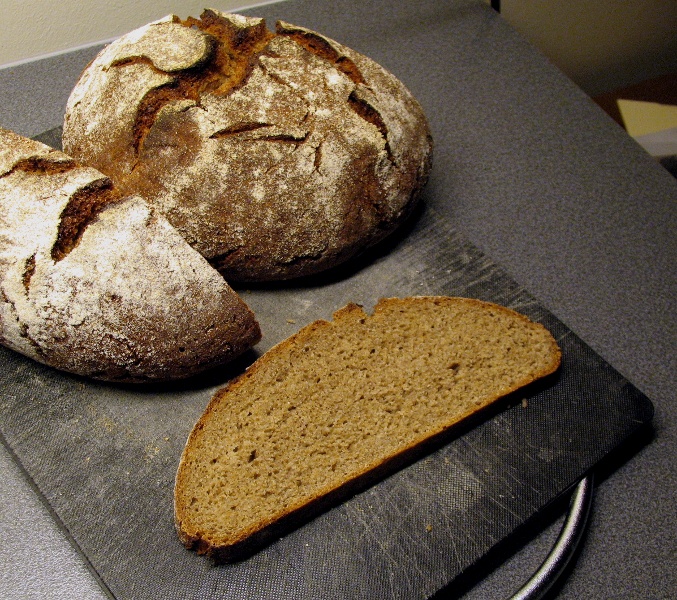
Just what I'm looking for this time of year.
As the title of the blog post warns: There are no apple tarts this week. I hope all's not lost, and that there's still room for Sunday dinner... Another favourite of mine is quiche. I'm not sure if what I made yesterday qualifies as a quiche - according to Robuchon, there's no onion nor grated Gruyère in a proper quiche lorraine. Adding grated Gruyère is supposedly something the posh Parisians did - and the onion? Well, if you put onion in there, it's an onion tart. It's a minefield, I know, so I'll call this my favourite Sunday bacon-and-onion tart. Below's the mise en place: Prebaked tart shell, a custard (in the white bowl, center-top), cooked onion and bacon, and Gruyère. I like a crisp tart crust, and due to the rather liquid filling, I try to give the tart shell a full 20 mins. prebake before filling it.
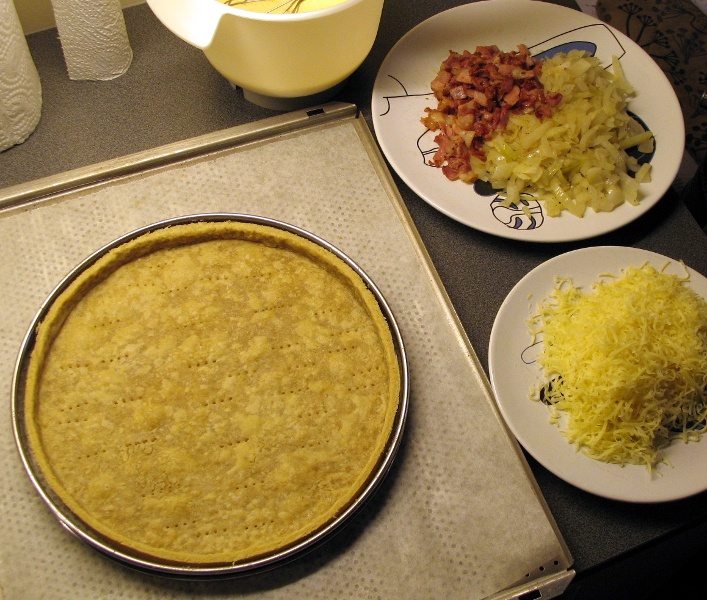
Voila! Here's the tart after 35 mins in the oven:
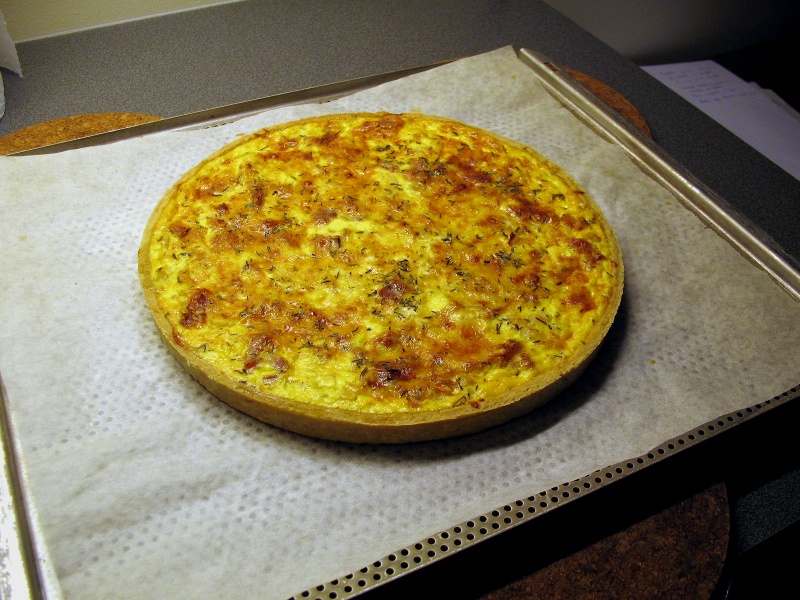
Bon appetit!
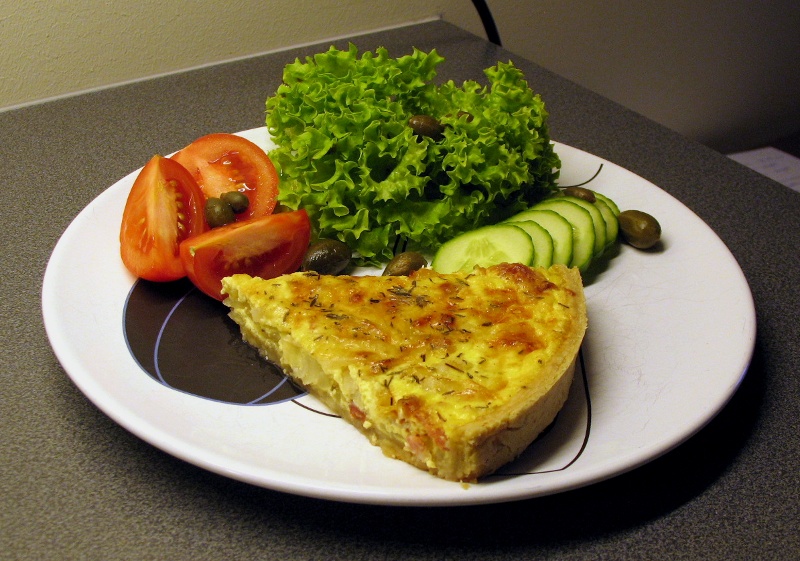
- hansjoakim's Blog
- Log in or register to post comments
The plate presentation is wonderful. I am pretty sure I'd receive a 4.0 in my culinary classes currently if I were to present such a nice dish.
Your ryes are always scrumptious looking as well Hans. I wish I could build up my rye skills to even just coming close to what you can bake. Last time I attempted the 80% rye I felt it was lacking due to my knowledge of higher percentage ryes.
Thanks! :D
I hope your grading system is different from the old, Norwegian one: Here, a 4.0 would mean "barely passed"... ;-) Nowadays, there's a A -> F grading system, but when I started at the university, the scale was numeric, with 1.0 being best and 6.0 being worst. 4.0 meant "just passed".
If you don't mind me asking: What kind of culinary classes are you taking? My interest in baking and cooking developed rather late; I was about midway through my university studies when I "discovered" this, which has since become my favourite hobby and pastime.
I hope you're not giving up on rye breads, arlo. Practice makes perfect! I felt that this 80% rye turned out fairly well, especially since it was the first time I tried the adapted version described in the formula I linked to, but I might increase the hydration slightly in the next bake. Rye breads can be so temperamental, and even small changes in the overall formulation can vastly improve the outcome.
Thanks again, arlo!
and then you threw in onions and bacon, too! What a great tart, hansjoakim!
And the breads are lovely, too. I like the random tearing of the rye's crust.
Paul
Your Breads are well made and baked, but i love how your ryes look. I'll try Hamelman's Rye soon.
Thanks for the added inspiration, hans.
I make tarts in similar flavors often. When I was little, I didn't like onions, now I can't get enoug of caramelized onion, especially combined whith lots of cheese!
Another beautiful Bake hansjoakim.
I've never made a tart so forgive the foolish question. Does one pour the custard which I presume is eggs, cream or milk whisked into the shell and then add the onions, bacon and cheese? Or do you combine all, then pour into the shell? Is that dill I see on the top? Such a delicious looking plate.
Eric
Hans, your posts always make me so hungry! Just Gorgeous and everything is perfect.
Sylvia
Why did I have to open this post so close to meal time....Well, I'm off to get a doz eggs, some cream, onions and bacon and indulge in hansjoakim's decadence. Beautiful. A bottle of good white wine? You bet.
Bernie Piel
it could be my Sunday favorite, too...
Karin
on My Favorite Things, and come to think of it, adding Coltrane to your ensemble makes a great quartet as well!
Your pain au levain reminds me why it is my favorite everyday bread - it's so adaptable to variations, and your combination of rye starter with some whole wheat flour must add such a nice complexity to its flavor.
The rye looks dense and moist, and the au naturel scoring just accents the beauty of the boule. I'm continuing my rye explorations, but your beautiful hearth loaf calls up a dilemna I'm facing: whether to bake in pans, and thereby gain some volume and more open crumb, or to forgo that for a hearth-style bread that will have a somewhat lower profile.
The tart reminds me, as I've shared with you, that my current shrinking tart shell problems would necessitate me making a pretty thin omelet to fit within the shell.
As usual, a feast for the eyes.
Larry
PS - Last Christmas I treated myself to my own gift: a CD of the Thelonious Monk Quartet with Coltrane at Carnegie Hall in 1957. What a conversation they carried on!
I look at your creations and am continually refreshed by their wholesomeness and beauty in presentation.
Coltrane had a gift, as do you, Hans. We all make our own music in different ways and I sure enjoy yours.
Your bread and tart look GORGEOUS! I admire your scoring skill! I actually tried your 40% rye sourdough recipe, the was delicious! I will try these pain au levain and rye bread soon. Thank you for your recipe that is easy to use!!
Best wishes,
Akiko
Thanks so much, Akiko!
I'm very glad to learn that you tried the 40% rye. Happy baking! :)
Everyone, thanks so much for your enthusiastic, heart warming replies! :D
Eric: Thanks! You're right about the custard: I used roughly 150 gr. each of cream and milk, and mixed that with 2 whole eggs and 2 egg yolks. Season with salt, pepper, grated nutmeg and a pinch of cayenne pepper. I think it's better to place onion, bacon and cheese in the tart shell first, then pour custard on top. If you combine everything and pour into the shell, it'll likely get messy and hard to distribute the filling evenly. What you see on top is a light sprinkling of thyme! Thanks again :)
Larry: Oh, yes, that Blue Note Carnegie Hall release was one of my absolute favourite releases of 2005. You can hear how inspired both of them are to be in each other's company, and it's amazing how quickly they gelled together in this quartet. 2005 was a high mark in Trane's catalog, as "One Down, One Up - Live at the Half Note" (an insane live recording from 1965) was also released that same year... Thanks, Larry! Your comments are always inspiring.
All the rest: Thanks again!
Hello,
Once again, I am delighted to see photos of your beautiful, perfect breads and pastry.
I so admire your boules and wanted to please ask if it was something particular about rye sourdough that makes the loaf open up in such an attractive way during the bake, or is it shaping technique (or both?)?
As an aside, I also admire your perforated baking sheet; I'm sure it's a great tool to have to help promote a crisp crust for pastry.
Thanks from breadsong
Thanks so much!
The way the rye loaf opened up during baking is mainly a result of shaping technique: You shape it into a boule, but proof it "upside-down". That is, you bake it with the seam side up. The seam itself, which is usually underneath the boule, is a weak spot in the dough surface, and the most likely part of the dough that will tear as the dough expands in the hot oven. You could do the same thing for all-wheat doughs too. When you're working with mainly wheat-based doughs, you can easily see a thin skin on the outside of the dough as you're shaping a boule. You'll want to tighten the skin, so the loaf comes out with a high profile after baking. With rye-based doughs, this skin is very fragile and tears very easily. This characteristic of rye doughs means that they are well suited for this kind of "upside-down" baking, where you get these not-so-random cracks in the loaf (usually in regions where the seam was).
Hello, Thanks for this information. I tasted some really good rye bread recently and it was an epiphany of sorts...now I want to try making my own! I hope to one day make loaves as pretty and perfect as yours. I'm looking forward to building a rye starter and giving it a go. Thanks from breadsong
Currently I am taking my local colleges Food Management and Business Program. I am a few credits away from my degree is Business Management and Hospitality. My classes (of the cooking nature) include/included French gourmet kitchen production, bakery production, Thai cooking, Chinese, Middle Eastern and well lots of good stuff. A wide range really, since I want to be educated in more than just one style of cooking.
At this stage I am planning on achieving my degree and then training under my current chef through more classes he offers and hopefully in programs around the state in preparation for my American Culinary Federation Pastry Chef Certification, then after that (maybe a few years down the road), Executive Pastry Chef and then finally my dream of one day achieving Master Pastry Chef. Please note all of these certifications include a lot bread baking, not just pastry.
Of course I feel I am still far, far away from attempting my first certification. As for the grading, 4.0 is currently the best you can achieve. The beautiful, well rounded colors you present and the clean eye appeal I see on your plate would be good enough for me to give you a 4.0! But I am a student with much to learn!
And to wrap up this winded response, I have not given up on rye! I am still baking heavily at work and at home between going to school. Though work is at a bakery, I can't get enough so I bring my work home! Although I just haven't had a moment to post pictures of anything I have baked since things are getting a bit more demanding of my time lately.
Hiya Hans.
Well, looking at your quiche/tart I'm ravenous...and I just had a more than ample lunch of fresh-baked pain de campagne with honeyed ham shaved off the bone! Your baking is art.
I've typed out your pain au levain - gotta try it! I think mine is pretty good, but that's a relative assessment, and going by everything else you bake I am expecting yours to be really something else!
Just three quick questions on your pain au levain, if you don't mind.
Cheers!
Ross
Thanks so much! You're much too kind...
Best of luck and I hope it works out! :)
I do all my mixing by hand, so I suspect that explains why I generally need to do more S&Fs - my hand-mixed dough is no doubt not as well combined as yours. Anyway, your comments on ensuring the dough does not get "too bucky and tight" during the BP duly noted and appreciated.
Cheers
Ross